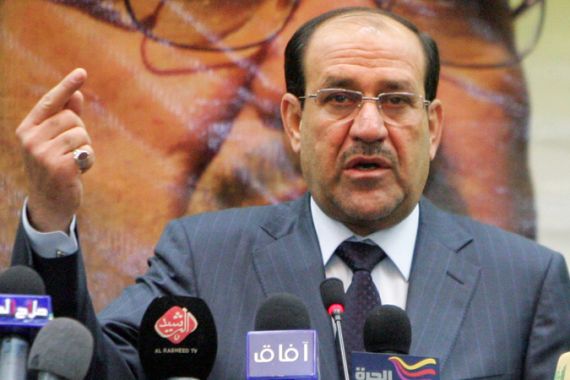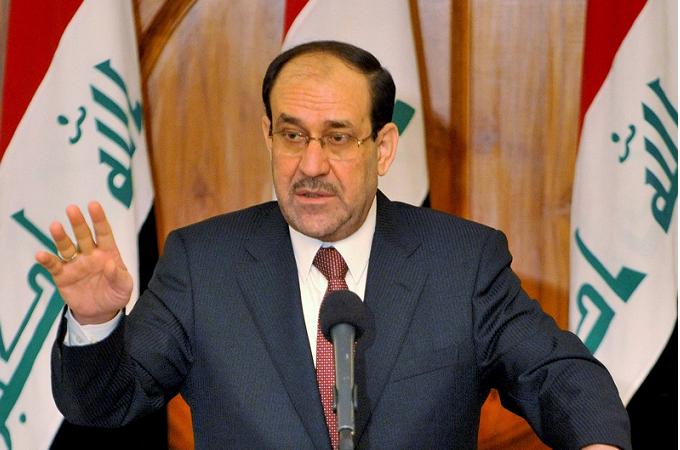Maliki asks for patience on Iraq reforms
Premier cites progress over past 100 days and asks for more time, but opponents already calling for protests on Friday.

 Maliki said ministers have made progress on ‘short-term issues’ over the last 100 days [EPA]
Maliki said ministers have made progress on ‘short-term issues’ over the last 100 days [EPA]Iraqi prime minister Nouri al-Maliki has backed down from a threat to fire poorly-performing cabinet ministers, a move which potentially opens the door to renewed popular protests in the country this summer.
Maliki gave his cabinet a 100-day deadline to improve basic services after a string of anti-government protests across Iraq in February.
He promised to assess their progress at the end of that period, and warned that “changes will be made” at failing ministries.
That deadline expired on Tuesday – and Maliki largely retreated from his threat, instead asking for patience and more time to solve problems.
“There are those who want to confuse the concept of this programme,” Maliki said in an address on state television on Monday night.
“They want to push people to force ministers to be accountable for a few things that naturally should take more time.”
Four-year plans
Maliki praised what he called short-term progress such as new construction projects which have sprung up across Iraq.
“Each minister has a four-year plan and will explain the track they want to follow in the next 100 days,” he said.
But it is unclear whether these modest reforms will head off further demonstrations. A protest has already been called against the government for Friday afternoon in Baghdad, the capital.
Reidar Visser, a senior research fellow at the Norwegian Institute of International Affairs, said Maliki backed off on his threat to fire ministers because he would have trouble pushing through a new government lineup.
“I think Maliki’s actions testify to the vey limited room for maneouvre that he has got, politically speaking,” said Visser, who edits the Web site historiae.org.
“He talks tough and refers to a ‘political majority,’ but in practical politics it is painfully clear that he has not got the votes to do what he wants in parliament.”
Protests swept across Iraq in February, fuelled by public anger over electricity shortages and other government failings.
Thousands took to the streets in Baghdad, demanding jobs, electricity and the firing of local officials.
Demonstrations also broke out in Mosul, in northern Iraq; Anbar province, in the west; Basra, in the south; and a dozen other cities and towns.
More than 20 people were killed by security forces during the protests.
The government has already made a few concessions to popular anger.
In February, it diverted $900m – originally earmarked to buy F-16 fighter jets from the US – to provide food for the poor.
Last week, Maliki announced a $400m fund to provide free fuel for generators this summer.
Blackouts and bad water
Many Iraqis rely on the generators to run air conditioners and other essential appliances, particularly during the brutally hot summer months.
Iraq actually generates more electricity today – roughly 7,900 megawatts – than it did before the US-led invasion in 2003.
But demand has increased even faster, to more than 15,000 megawatts, nearly double its pre-war level, and Iraq’s infrastructure has been unable to keep pace. Rolling blackouts are common, with much of the country dark for at least eight hours a day.
Electricity shortages prompted angry demonstrations across southern Iraq last summer.
Water shortages are another worsening problem. At least 20 per cent of Iraqi households have unsafe supplies of drinking water, according to the UN, and much of the water used for agriculture “violates World Health Organisation guidelines”.
The UN also says that more than 80 per cent of Iraq’s sewage is not treated – instead, it is released directly into rivers and streams.
Other key issues include jobs – the official unemployment rate stands at 15 per cent, while unofficially, as many as one in three Iraqis are jobless – and poor public health care and education services.